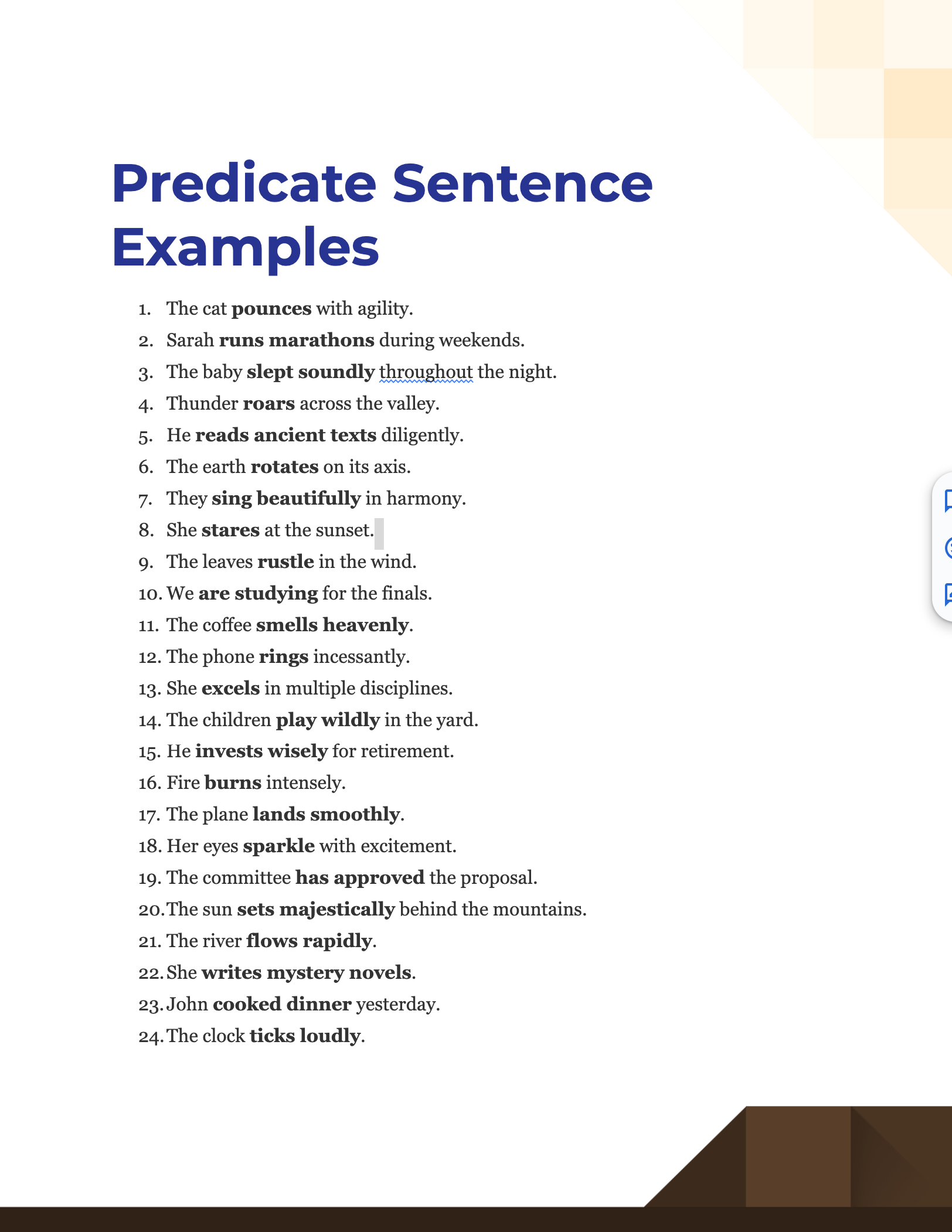99+ Predicate Sentence Examples
Predicates are the unsung heroes of complete sentences, often overshadowed by subjects. However, a well-crafted predicate can make or break the sentence, adding depth and meaning to your words. In this comprehensive guide, we’ll explore what predicates are, share detailed sentence examples, and provide tips on how to write impactful predicate sentences. Whether you’re a seasoned writer or a newbie, this guide is a must-read to elevate your writing skills.
What is the Predicate Sentence? – Definition
In simple terms, a predicate is the part of the sentence that tells us what the subject is doing or what condition it’s in. It always contains a verb and may also include other elements like objects, complements, or adverbs. For instance, in the sentence “The dog barks loudly,” “barks loudly” is the predicate.
What is the Best Example of a Predicate Sentence?
A standout example of a predicate sentence would be: “She dances gracefully under the moonlight.” In this sentence, “dances gracefully under the moonlight” is the predicate. It not only tells us what the subject, “She,” is doing (dancing), but it also enriches the sentence by adding details like “gracefully” and “under the moonlight.” This creates a vivid image and an emotional impact, making it an effective predicate sentence.
By using strong verbs and adding relevant details in your predicates, you can create sentences that captivate the reader and add depth to your writing.
100 Predicate Sentence Usage Examples

Understanding how to craft compelling predicates can significantly elevate your writing, making it more vivid, impactful, and engaging. Whether you are writing fiction, academic essays, or persuasive articles, incorporating well-thought-out predicates is key. Below are 100 distinct and carefully selected predicate sentence examples designed to inspire and guide you in enriching your own sentences.
- The cat pounces with agility.
- Sarah runs marathons during weekends.
- The baby slept soundly throughout the night.
- Thunder roars across the valley.
- He reads ancient texts diligently.
- The earth rotates on its axis.
- They sing beautifully in harmony.
- She stares at the sunset.
- The leaves rustle in the wind.
- We are studying for the finals.
- The coffee smells heavenly.
- The phone rings incessantly.
- She excels in multiple disciplines.
- The children play wildly in the yard.
- He invests wisely for retirement.
- Fire burns intensely.
- The plane lands smoothly.
- Her eyes sparkle with excitement.
- The committee has approved the proposal.
- The sun sets majestically behind the mountains.
- The river flows rapidly.
- She writes mystery novels.
- John cooked dinner yesterday.
- The clock ticks loudly.
- The athlete sprints quickly.
- The band plays energetically.
- His heart beats frantically.
- The kids are swimming in the pool.
- He builds wooden furniture.
- The students listen attentively.
- The artist paints with passion.
- Snow covers the ground.
- The squirrel climbs the tree.
- The girl screams in horror.
- The wind howls through the trees.
- The flowers bloom vividly.
- The music echoes softly.
- He acts responsibly.
- The bird flies high.
- The car accelerates quickly.
- The actor performed brilliantly.
- The judge speaks sternly.
- She types fast.
- The doctor operates carefully.
- The children have built a sandcastle.
- The computer functions optimally.
- They discuss politics.
- She dresses elegantly.
- The camera captures the moment.
- The crowd cheers loudly.
- The team wins frequently.
- They argue heatedly.
- He drinks coffee in the morning.
- She eats healthily.
- The elephant trumpets loudly.
- The ship sails smoothly.
- She knits skillfully.
- The snake slithers silently.
- The choir sings harmoniously.
- The bell rings at noon.
- The sun rises early.
- He writes poems.
- The chef cooks deliciously.
- The dog fetches the ball.
- They talk quietly in the library.
- The machine works efficiently.
- He swims professionally.
- The farmer plows the field.
- The fish swims upstream.
- The lion roars mightily.
- She giggles nervously.
- The engine runs smoothly.
- The writer types furiously.
- The dancer moves gracefully.
- The teacher explains clearly.
- The car honks loudly.
- The audience claps appreciatively.
- The rain falls gently.
- She solves math problems.
- The tourists take photos.
- He jumps high.
- The book sits on the shelf.
- The student studies hard.
- The couple dances elegantly.
- The storm rages fiercely.
- The computer boots up quickly.
- She speaks French fluently.
- The wind blows coldly.
- The clock strikes twelve.
- The musician plays the guitar.
- He creates digital art.
- The pilot flies the plane skillfully.
- They celebrate joyously.
- The cat sits lazily.
- The drummer hits powerfully.
- The horse gallops fast.
- The toddler cries loudly.
- The scientist conducts experiments.
- The gardener plants trees.
- The poet recites dramatically.
Each of these examples showcases how a strong predicate can add depth and variety to your sentences, transforming them from simple statements into powerful conveyors of action, mood, or intention.
What is a Simple Predicate Example?
A simple predicate is the main verb or verb phrase that tells something about the subject of the sentence. It excludes additional information such as adverbs, adverbial phrases, or other qualifiers. For instance, in the sentence, “The dog runs quickly,” the word “runs” is the simple predicate. It succinctly conveys the action of the subject, “the dog,” without additional descriptors like “quickly” that make it a complete predicate. Simple predicates are elemental in forming a clear, straightforward sentence and play a pivotal role in effective communication.
What is Sentence or Predicate?
The terms “sentence” and “predicate” often come up in discussions about grammar, but they serve different functions in a sentence structure. A sentence is a word or group of words that express a complete thought. It generally consists of a subject and a predicate. On the other hand, the predicate is a part of the sentence that tells what the subject is doing or what is happening to the subject. It usually includes a verb and all the other words that describe the action or state. Understanding the role of the predicate is crucial for constructing meaningful, informative sentences.
How do you write Predicate Sentences? – Step by Step Guide
- Identify the Subject: Before you write a predicate, you should know the subject of your sentence. Ask yourself, “Who or what is this sentence about?”
- Determine the Action or State: Decide what the subject is doing or what state it is in. This will be your verb or verb phrase.
- Add Descriptors: To make your predicate more descriptive, consider adding adverbs, adverbial phrases, or other elements that can provide additional information about the action or state.
- Check for Completeness: Ensure that your predicate gives enough information to complete the thought initiated by the subject.
- Review for Clarity: Reread your sentence to make sure that the predicate is clear and adds meaningful content to the sentence.
- Punctuation: Make sure to use appropriate punctuation to end your sentence.
Tips for Using Predicate Sentences
- Use Strong Verbs: Strong verbs make your predicate more impactful, reducing the need for additional adverbs.
- Keep It Concise: A concise predicate often makes a sentence more clear and easier to understand.
- Be Specific: Specificity in a predicate can make your sentence more informative and engaging.
- Balance with Subject: The predicate should be balanced with the subject to form a complete, coherent sentence.
- Variety is Key: Don’t shy away from using different types of predicates—simple, compound, and complex—to add variety to your writing.
- Context Matters: The predicate should fit the tone and style of your overall writing. For example, an academic paper will have different types of predicates compared to a casual blog post.
- Review and Edit: Always review and edit your predicates to ensure they are grammatically correct and align well with the subjects.
By paying attention to these tips and guidelines, you can master the art of crafting compelling predicate sentences that not only complete your thoughts but also add a layer of depth and complexity to your writing.



